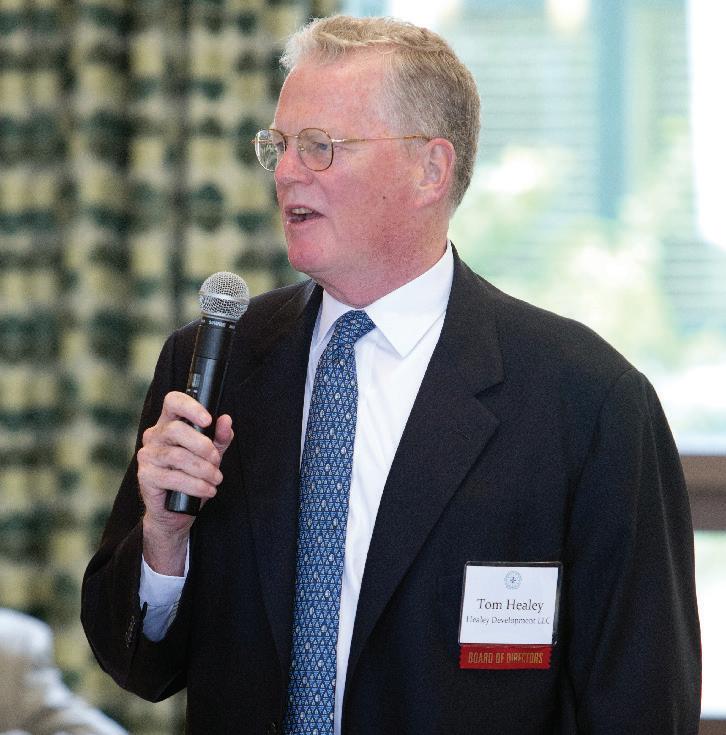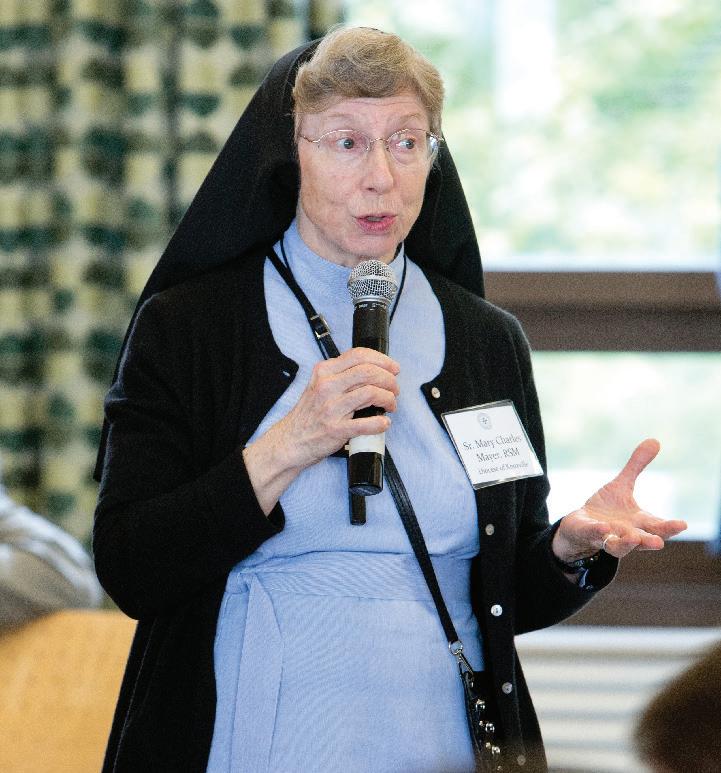
4 minute read
SELECTED QUESTIONS, ANSWERS, AND COMMENTS
John Deinhart
It’s really hard for the first three parishes in our program, but suddenly you have six and then nine. I believe there’s a ripple effect and like any best practice it will continue to grow. But the Toolbox and Standards for Excellence can’t continue being our bestkept secrets. We have to get the word out about what they do and how they transform. And part of that is the responsibility of the leadership of the Church.
REV. BAUTISTA
HEALEY Treasurer, The Leadership Roundtable
One of the challenges we face at the Roundtable is maximizing the impact of our successes. Let me give you an example using the Toolbox for Pastoral Management. We’ve had seven or eight sessions, with 30 to 35 men at each. That adds up to around 240 priests. But there are 18,000 pastors in the Catholic Church. How do we engage all the ones we missed? One of the things we’re thinking about experimenting with is distance learning to increase our reach. In your discussion on Standards for Excellence, John, you gave a wonderful example of how it’s impacted three of your parishes, and is now being rolled out to three more. Yet you said you have 51 parishes. If you roll out three every year-and-a-half, that’s an extremely long implementation period. So my question is, how do we put that process on steroids?
I feel that those of us who have participated in the Toolbox need to become ambassadors for the program, and let our brother priests and brother pastors know of the results in our own parishes and what it’s meant to our ministries. I also think there needs to be better coordination on a national scale so that the bishops would support the program no matter what region or what province you’re in.
SISTER MARY CHARLES MAYER Associate Chancellor for Pastoral Services, Diocese of Knoxville

Part of my job will be taking our directors out to meet the pastors, and being in dialogue with them. And it occurred to me that I need to become very familiar with the Toolbox so that I can take that knowledge to the pastors and educate them about the program so it could possibly be of service to them. To me, that’s a practical and immediate way to spread the word about Toolbox.
Susan King
I’d like to ask Father, now that you’ve done the Toolbox and seen its results, what about the Catholic Standards for Excellence? Does that need to be brought to your parish, as well?
REV. BAUTISTA
Yes, I think it’s very important that every parish incorporate the Standards. It gives us the opportunity to see how we can best serve those who need us, whether it be parishioners or the community in general. I think we often need to figure out creative ways as a Church to better use the people we have, to channel their talents and their abilities in the right direction. In my parish we have many people who want to volunteer, but their energy is channeled in the wrong way. The Standards for Excellence would give us the opportunity to evaluate not only our parishioners, but the parish staff.
Carol Walters
Director of the Office for Lay Ecclesial Ministry, Archdiocese of Chicago
You’ve talked, Father, about how the Toolbox has helped you when you had to lay off someone. Can you tell us how the Toolbox has helped you to energize your staff to become more involved in parish life?
REV. BAUTISTA
One of the things I learned through the Toolbox is that it’s not just about ‘this is what Father wants,’ or ‘this is what Father does,’ or ‘this is what we should do.’ We now have at my parish biweekly staff meetings where I bring to the table different options for all of our staff, and I get all of their inputs. I really think it’s about a Father being able to collaborate with them and acknowledging, You’ve been here longer than I have. My approach now is, Let’s talk about a particular program, ministry or practice (like Sunday Mass schedule), even if we have to change it. I ask them, How do you feel? Is this something that’s going to work? What are people telling you in your ministry? As a result, my staff is now able to work effectively together without me being on top and sort of dictating everything.
Nicole Perone
Student, Yale Divinity School, the Master of Divinity Program
As far as getting young people involved, I’m super inspired by what the Roundtable is doing for the Church in America.
It sounds like there’s a wonderful revival occurring in the parishes and in the Church. I’d like to ask the panelists what they plan to do in terms of getting young people, the future stakeholders of the Church, more engaged.


REV. BAUTISTA
After participating in the Toolbox, I cut my 150-member parish council to down to 15, and one of the requirements is that we have a young adult member. I also realized the need to meet young adults and youth at their level, so I try to keep up with the technology they’re into, including the latest phone aps. Another thing I did was bring in a much younger youth director, someone who had just graduated from college. And in just one year, I’ve seen a difference in the way they’ve been able to connect with young people in our parish. I believe that ability to relate to youth as well as adults is very important to any parish. As Pope John Paul II was fond of saying, ‘They’re not the Church of the future, they’re the Church of today.’
Frank Donio
Director of the Catholic Apostolate Center, Washington, D.C.
We need to engage people who are postcollegiate, people like those ESTEEM is preparing. And that’s one of the key problems I’ve seen not only in our work as a Center, but in terms of pastoral ministry. That period—after people come out of these wonderful campus ministry programs, or programs like ESTEEM, and move to various parts of the country to find work—is so important in terms of keeping them engaged in the parish community. Our Center, for example, is partnering with the Archdiocese of Washington, D.C., to develop a post-collegiate program not only for evangelization, but for engaging young adults in meaningful ways in leadership roles and in the ministry, both within and beyond the borders of the Church.
National Leadership Roundtable on Church Management 2014 Annual Meeting
The Standard for Excellence:
BEST PRACTICES FOR A MISSION DRIVEN CHURCH Loyola University Chicago | Lake Shore Campus | June 24-26, 2014 www.TheLeadershipRoundtable.org/AnnualMeeting







